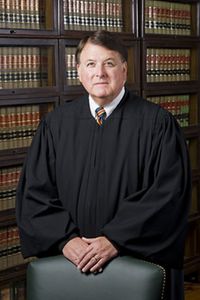Randall Shepard
Randall T. Shepard was a justice on the Indiana Supreme Court and served as Chief Justice from 1987 until his retirement in March 2012.[1] He was appointed to the court by Governor Robert D. Orr and took office on September 6, 1985 at the age of 38, becoming its ninety-ninth justice. He became its chief justice in March of 1987. [2]
Shepard was retained by the state's voters in retention elections in 1988, 1998 and 2008. [3][4]
Nominating commission
Shepard was the Chairman of the Indiana Judicial Nominating Commission, a seven person board charged with selecting Supreme Court Justices, filling other judicial vacancies, and administering discipline on cases of judicial misconduct.[3]
Education
In 1969, Shepard graduated from Princeton University and from Yale Law School in 1972. He earned a LL.M. in judicial process from the University of Virginia in 1995.[5]
Professional career
After graduating from law school, Shepard served as Special Assistant to the Under Secretary of the U.S. Department of Transportation. Two years later, he became Executive Assistant to the Russell Lloyd, then-mayor of Evansville, Indiana. After five years in this position, he became judge of the Vanderburgh Superior Court in 1980.[5]
Awards and associations
- Recipient of the Dwight D. Opperman Award for Judicial Excellence.[6]
- The Evansville Bar Association dedicated the "Randall T. Shepard Courtroom" in honor of Judge Shepard.[7]
Elections
Shepard was retained in 2008 with 73.2% of the vote.[8]
Political outlook
In October 2012, political science professors Adam Bonica and Michael Woodruff of Stanford University attempted to determine the partisan ideology of state supreme court justices. They created a scoring system in which a score above 0 indicated a more conservative-leaning ideology, while scores below 0 were more liberal.
Shepard received a campaign finance score of 0.49, indicating a conservative ideological leaning. This was more conservative than the average score of 0.01 that justices received in Indiana.
The study was based on data from campaign contributions by the judges themselves, the partisan leaning of those who contributed to the judges' campaigns, or, in the absence of elections, the ideology of the appointing body (governor or legislature). This study was not a definitive label of a justice, but an academic summary of various relevant factors.[9]
See also
- News: Chief Justice Shepard to retire from Indiana Supreme Court, December 8, 2011
External links
- Indiana Courts, Randall T. Shepard Biography (dead link)
- Three Indiana justices on Nov. ballot
- American Inns of Court, "The Honorable Randall T. Shepard"
- The Herald Bulletin, "Caseload: Indiana court filings on the rise," April 21, 2010 (dead link)
- Chief Justice Shepard's 2011 State of the Judiciary address (dead link)
- Indiana Daily Student, "Indiana Chief Justice addresses December graduates," December 17, 2011
Footnotes
- ↑ Chief Justice Shepard to retire from Indiana Supreme Court
- ↑ Indiana Supreme Court: Current Justices
- ↑ 3.0 3.1 Official biography of Justice Shepard (dead link)
- ↑ American Judicature Society: Methods of Judicial Selection
- ↑ 5.0 5.1 Project Vote Smart, Chief Justice Randall T. Shepard
- ↑ Kokomo Perspective, "Chief Justice Randall Shepard To Receive American Judicature Society Award," December 8, 2009
- ↑ Press Release: "Evansville bar Association Dedicates Courtroom in Honor of Chief Justice Randall T. Shepard," May 11, 2011
- ↑ Indiana Secretary of State, 2008 General Election Results
- ↑ Stanford University, "State Supreme Court Ideology and 'New Style' Judicial Campaigns," October 31, 2012
Federal courts:
Seventh Circuit Court of Appeals • U.S. District Court: Northern District of Indiana, Southern District of Indiana • U.S. Bankruptcy Court: Northern District of Indiana, Southern District of Indiana
State courts:
Indiana Supreme Court • Indiana Court of Appeals • Indiana Superior Courts • Indiana Circuit Courts • Indiana City Courts • Indiana County Courts • Indiana Municipal Courts • Indiana Small Claims Courts • St. Joseph County Probate Court • Indiana Tax Court • Indiana Town Courts
State resources:
Courts in Indiana • Indiana judicial elections • Judicial selection in Indiana



